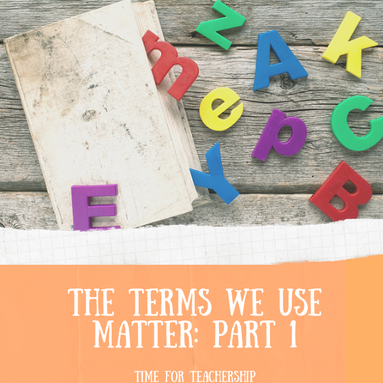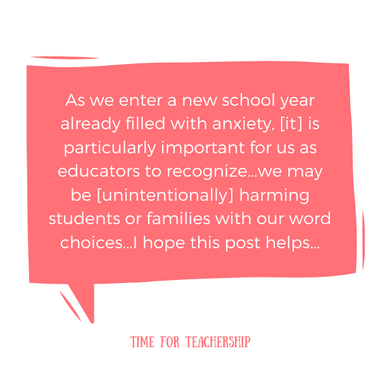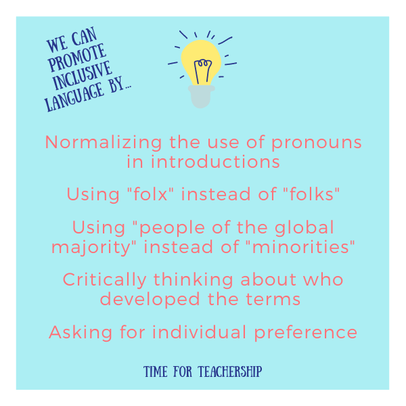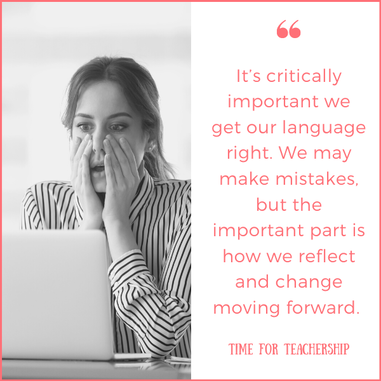|
Language is so important. The words we use to refer to people and the issues people face carries a great deal of weight. While it may be cumbersome to unlearn old terminology and start using new words and phrases, if a group of people are saying certain phrases hurt, it’s necessary to listen and work to change our vocabulary. Ayanna Pressley says “the people closest to the pain should be the closest to the power.” I think this applies to who gets to determine the language we use. If people have experienced the pain of inappropriate or offensive language and I haven’t, I want to listen and learn and do my best to follow the recommendations of the people “closest to the pain.” As we enter a new school year already filled with anxiety, this is particularly important for us as educators to recognize, as we may be harming students or families with our word choices. For many of us, we may not know better, so I hope this post helps us know better, so that (in the paraphrased words of Maya Angelou) we can do better. Before I share some of the things I’ve been learning with regard to specific identity groups, I want to say there is much I have yet to learn. Please share any additional information I’m likely missing or any corrections to what I’ve shared. Also, as a general rule, I like to listen to how people self-identify (or ask if this information is not shared), as each person may prefer different terminology, and it’s important we use the terms our students, family members, and colleagues want us to use. Gender. A powerful practice for the start of the year as you ask students to introduce themselves and you introduce yourself is to ask for (and state your own) pronouns. This is a great way to normalize asking for a person’s pronouns, start a conversation about pronouns and their importance, and prevent any misgendering of students. You could encourage students to add their pronouns to their “screenname” for video conferencing and in their email signatures. Additionally, I have recently been trying to use the spelling “folx” instead of “folks” to intentionally include queer or GNC (gender non-conforming) people. Race. Firstly, race is an adjective, not a noun. For example, in the phrase “white people,” white is an adjective, whereas “whites” is an example of using race as a noun. The term “minorities'' is often used to refer to people who are not white, but it’s a relative term. In a specific school, the majority of students may be white, but globally, white people are the minority. This is why I want to start using the term “people of the global majority;” it flips white supremacist language and the assumptions behind it on it’s head. Some folx like the term “people of color,” but this term has also been critiqued for its normalization of whiteness (ignoring that white is also a color) and for being US-centric. BIPOC (Black, Indigenous, and People of Color) is a term that names specific racial groups, which is helpful when discussing topics that are particularly relevant to the listed groups (e.g., police brutality and mass incarceration). When calling out racial injustice, we want to be specific, making it clear which groups are disproportionately affected. “Latinx,” (pronounced La-TEEN-ex) a term inclusive of all genders, is typically preferred over the term “Hispanic,” as the latter was imposed on Latinx people and reflects Spanish colonialism. Although, I have also worked with a “Hispanic-Serving Institution” that surveyed students about their preference, and the students said they preferred the term “Hispanic.” This served as a reminder to me that asking students’ preference is best practice. Another reason to ask is that some groups will prefer a more specific term than the broad “Latinx” like Chicana/o for folx of Mexican descent. “Indigenous” or “Native peoples” are terms I’ve seen most commonly used by Indigenous activists and scholars. However, some prefer American Indian. That said, the term “Indian” refers to people from the country of India, not people indigenous to the North American continent. The word “Oriental” describes material items, like rugs, not human beings. Asian is the term used to describe people. Terms like “Middle East” and “Far East” come from British colonialism, normalizing Britain as a reference point. Terms I have heard used in place of the “Middle East” include “the Arab world” and when referring to people from this region of the world, the acronym “AMEMSA” (Arab, Middle Eastern, Muslim and South Asian) can be used. Other problematic race-related terms I have heard used in schools include “gyp” (an offensive reference to “gypsies,” for whom the accurate term is Romani people; “Eskimo” (a label assigned to the Inuit people by colonizers), and “ghetto” (a racialized and classed term that is rooted in the religious oppression and physical segregation of Jewish people and has since been used as a racially coded adjective that perpetuates stereotypical attributes of low-income Black communities). “Diverse” is another term that in itself is not problematic, but how it is used can be. If we refer to a school as “diverse” and it’s 95% Black, that’s not diversity, that’s a predominantly Black school. Using the term “diverse” as synonymous with Black is just not accurate. There are many more identities to discuss, so I will continue the conversation in the next post. I also want to acknowledge once again there are many terms I may not have talked about here, and there are likely mistakes I have made because I haven’t learned to correct them yet, so please feel free to share corrections or additional insights. I’m on this journey of growth along with all of you.
0 Comments
Leave a Reply. |
Details
For transcripts of episodes (and the option to search for terms in transcripts), click here!
Time for Teachership is now a proud member of the...AuthorLindsay Lyons (she/her) is an educational justice coach who works with teachers and school leaders to inspire educational innovation for racial and gender justice, design curricula grounded in student voice, and build capacity for shared leadership. Lindsay taught in NYC public schools, holds a PhD in Leadership and Change, and is the founder of the educational blog and podcast, Time for Teachership. Archives
May 2024
Categories |





 RSS Feed
RSS Feed